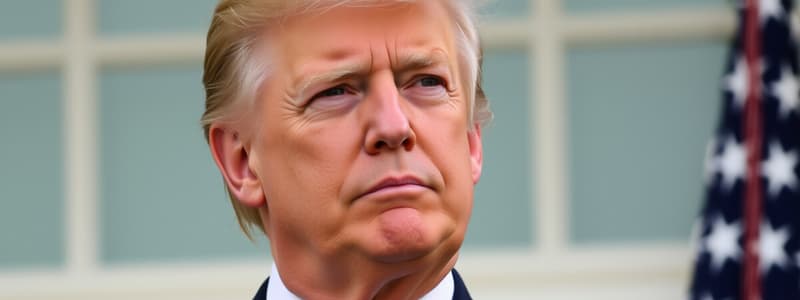Podcast
Questions and Answers
What does the President's role as Chief of State entail?
What does the President's role as Chief of State entail?
He is the ceremonial head of the government of the United States and the symbol of all the people of the nation.
What is the President's role as Chief Executive?
What is the President's role as Chief Executive?
The Constitution vests the President with the executive power of the United States.
What is the President's role as Chief Administrator?
What is the President's role as Chief Administrator?
Director of the United States government.
What is the President's role as Chief Diplomat?
What is the President's role as Chief Diplomat?
What does the President's role as Commander in Chief involve?
What does the President's role as Commander in Chief involve?
What is the President's role as Chief Legislator?
What is the President's role as Chief Legislator?
What does it mean for the President to be Chief of Party?
What does it mean for the President to be Chief of Party?
What is the role of the President as Chief Citizen?
What is the role of the President as Chief Citizen?
What are the qualifications to be President?
What are the qualifications to be President?
How did the 22nd Amendment place limits on presidential terms?
How did the 22nd Amendment place limits on presidential terms?
What was the precedent set by George Washington regarding presidential terms?
What was the precedent set by George Washington regarding presidential terms?
What are the President's pay and benefits?
What are the President's pay and benefits?
How does the Constitution provide for presidential succession?
How does the Constitution provide for presidential succession?
What is the order of succession following the Vice President according to the Presidential Succession Act of 1947?
What is the order of succession following the Vice President according to the Presidential Succession Act of 1947?
How does the Vice President become an 'acting' President?
How does the Vice President become an 'acting' President?
What are the Vice President's duties outlined in the Constitution?
What are the Vice President's duties outlined in the Constitution?
What were the original provisions for choosing the President?
What were the original provisions for choosing the President?
How did the 12th Amendment change how the President and Vice President are chosen?
How did the 12th Amendment change how the President and Vice President are chosen?
What is the function of the Electoral College today?
What is the function of the Electoral College today?
What are three major defects in the Electoral College?
What are three major defects in the Electoral College?
What are the two major strengths of the Electoral College?
What are the two major strengths of the Electoral College?
Flashcards are hidden until you start studying
Study Notes
President's Roles
- Chief of State: Ceremonial head representing the nation and its people.
- Chief Executive: Holds the executive power, ensuring laws are enforced.
- Chief Administrator: Directs the functions of the U.S. government.
- Chief Diplomat: Main architect of American foreign policy and spokesperson internationally.
- Commander in Chief: Holds complete control over the armed forces.
- Chief Legislator: Architect of national public policies.
- Chief of Party: Leader of the political party controlling the executive branch.
- Chief Citizen: Represents all citizens and leads by example.
Presidential Qualifications
- Must be a "natural born citizen."
- At least 35 years old.
- Must have resided in the U.S. for a minimum of 14 years.
Presidential Term Limits
- 22nd Amendment (1951): Limits Presidents to two elected terms, or one term if they succeeded to the office.
Historical Precedents
- George Washington established a two-term precedent, broken by Franklin D. Roosevelt who served four terms.
Presidential Compensation
- Salary set by Congress, currently $400,000 per year.
- Additional allowances: $50,000 for expenses, $100,000 for travel, $19,000 for entertainment, $10,000 for franking.
- Resides in the White House and has access to additional benefits like Air Force One and a dedicated office staff.
Presidential Succession
- 25th Amendment (1967): Dictates that the Vice President becomes President if the sitting President is unable to fulfill duties.
- Presidential Succession Act of 1947: Order of succession after the Vice President includes Speaker of the House, President pro tempore of the Senate, Secretary of State, Secretary of the Treasury, and Secretary of Defense.
Vice President's Role
- Presides over the Senate and assists in determining presidential disability.
Presidential Election Process
- Originally established by the Constitution to elect Presidents via a special body of electors casting two votes.
- 12th Amendment: Requires electors to cast separate votes for President and Vice President.
Electoral College Function
- Most states use the popular vote to select electors, except Maine and Nebraska.
- Electors meet to cast votes in December; results counted by the Senate on January 6.
- If no majority (270 electoral votes), the House of Representatives decides the election.
Defects of the Electoral College
- Winning the popular vote does not guarantee an electoral victory, as seen in four historical instances.
- Electors are not legally bound to vote according to the state's popular vote.
- If no majority is reached, the election can be decided in the House, which may disenfranchise larger populations.
Strengths of the Electoral College
- Provides a tested process that is familiar, reducing uncertainty in presidential elections.
- Typically ensures a quick and decisive election outcome.
Studying That Suits You
Use AI to generate personalized quizzes and flashcards to suit your learning preferences.




